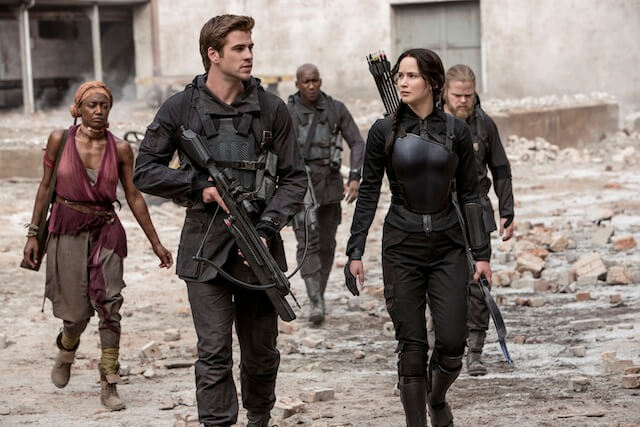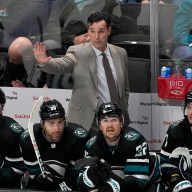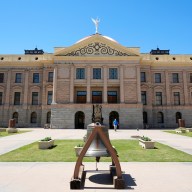‘The Hunger Games: Mockingjay — Part 1’ If the second “Hunger Games” played as a repeat of the first — and it did, with slight alterations — the third goes the opposite way: It’s nothing like either. Indeed, Katniss Everdeen, Jennifer Lawrence’s semi-reluctant dystopian revolutionary mascot, fires a single arrow. (She uses it to take out a hovercraft, but still.) It’s almost a new kind of blockbuster: a calm, collected, even shockingly intelligent look at waging war, done in the guise of a sleepy franchise middle section — or in this case, the first half of a book where most of the crazy stuff happens in the climax. Story-wise it barely holds up on its own, yet it may be the only case where splitting a book into two movies means retaining much-needed nuance. What was a tamed rip-off of the gory “Battle Royale” becomes more like Steven Soderbergh’s “Che”: a cerebral look at the gruntwork of revolution — with the YA-required threeway love story, of course. In fact, few films about revolution have been more complex and ambivalent. When it opens, in media res, Katniss appears to be in some kind of prison. She isn’t and she is; she’s in the bunker of the mighty rebellion. Their cause is just; the government, known as “the Capital,” is a fascist oligarchy who’ve kept the masses down and the one-percenters up. (Its leader, played by Donald Sutherland, even gets the shaving mishap that happens to Al Capone in Brian De Palma’s “The Untouchables” — he’s a more austere gangster.) But even noble revolutionaries can’t always keep themselves clean, and along with inadvertently separating Katniss from one of her beloveds — Josh Hutcherson’s meek nice boy Peeta — they sport shades of the bad guys. Their leader, President Coin (a silver fox Julianne Moore), seems faintly sinister. And Katniss is largely doing for the revolution what she did for Capital: dressing up in fashionable attire, striking iconic poses and making propaganda videos. The two sides aren’t not the same, but they’re not not the same. Coin talks of punishing apostates, like the captured Peeta — now a brainwashed Patty Hearst type, making rehearsed antiwar statements for the Capital. When Katniss goes out on missions, she’s protected, kept from fighting; unspeakable atrocities committed by the baddies are milked for propagandistic use. (Even the lone action scene is cut up into an even more dynamic action scene.) At the same time, playing dirty is how revolution works. Like “Lincoln” or the Chilean docudrama “No,” about the effort to oust dictator Augusto Pinochet using TV commercials, it understands that one effects change by borrowing tactics from the other side. But it also understands that this can create a confusing moral landscape, where the line between good and evil — or simply extremes — can be blurred. These are rich nuances for any film about war; that they’re in a mega-budgeted blockbuster that will likely crush all of the year’s entertainments is downright surreal. “Mockingjay” never punks out — but then, it doesn’t have the chance to. It’s still an incomplete film, stopping, as the last one did, almost mid-sentence — a cliffhanger of the most sadistic breed. And nifty though it is to have a thriller with few over-the-top thrills, “Mockingjay — Part 1” can also be too serious. It lacks the colorful Ken Russell insanity of life inside the aristocratic Capital, while Liam Hemsworth’s unfailingly boring Gale, now more prominent, makes Hutcherson’s Peeta look like a sugar high coke addict by comparison. (Elizabeth Banks has some fun with her repurposed ex-spokeswoman Effie Trinket, now a rebel who still thinks to dress like Rosie the Riveter.) It’s more admirable than engaging, though it’s smart to tie this into character; no matter how knotty things get, it’s still about Katniss and her evolving, conflicted feelings about heroic but messy (but heroic) freedom fighting. It might be the first popcorn movie that has much more in common with radical political cinema than the popcorn movie. If it went any farther into the book — if it didn’t halt so suddenly — that might be a different story.
Director: Francis Lawrence
Stars: Jennifer Lawrence, Liam Hemsworth
Rating: PG-13
3 (out of 5) Globes
Review: ‘The Hunger Games: Mockingjay —Part 1’ is oddly and admirably muted

Murray Close
Follow Matt Prigge on Twitter@mattprigge


















